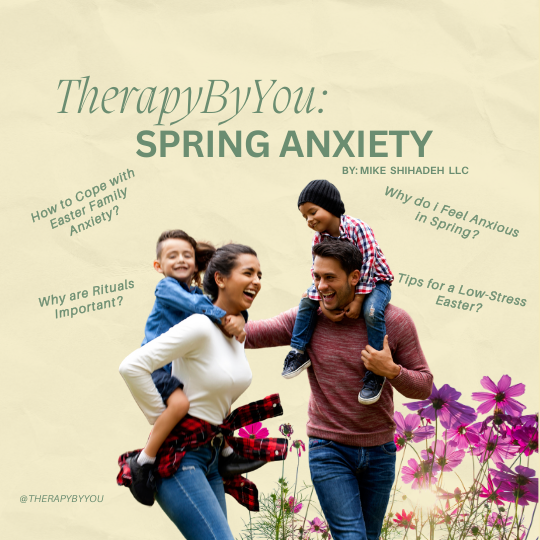Easter's Effect on Mental Health: Understanding Spring Anxiety
What does Easter symbolize for Mental Health?
When trees start turning green again, a lot of people feel something change inside them. You might feel like getting outside more, moving your body, or picking up good habits you stopped over the winter. Spring doesn't just bring new weather—it can also bring new feelings. Easter shows up right in the middle of all this change and often makes people think about new beginnings and hope, even if they don't celebrate it as a religious holiday.
In this article, we'll look at how Easter and spring can help your mental health. We'll talk about how the season affects our moods, how family time can be stressful, and how small traditions can give us comfort when life feels uncertain. We'll also offer tips to help you feel more grounded, peaceful, and prepared to take on whatever this season brings.
Ready to Navigate Spring Anxiety?
Learn how to manage seasonal changes and improve your mental well-being.
Schedule Your ConsultationWhy do I feel anxious in spring?
As spring begins and the days get longer, we start getting more sunlight. More sunlight helps your brain make a chemical called serotonin, which can help improve your mood (National Institute of Mental Health, 2020). For people who feel down in the winter, spring can bring relief and energy.
But even good changes can make us feel stressed. Mental health experts have noticed that more people feel anxious or sad in the spring, especially in April and May (Smith et al., 2017). This is called "spring anxiety." It may happen because our brains and bodies are adjusting to the new season and all the new things happening—like busier schedules and rising expectations (Johnson, 2021).
It's okay if you feel both excited and overwhelmed this time of year. Your brain is adjusting, and that can be tiring. Everyone reacts differently to spring, and however you feel is completely okay. Some people feel more energy and motivation, while others feel nervous or unsteady. Understanding what your body and emotions are going through can help you be kind to yourself.
How do I cope with Easter family anxiety?
Easter often means seeing family. That can be fun—but also stressful. Maybe you're seeing relatives you haven't seen in a while. Maybe some of those relationships are tough. Or maybe someone you loved is no longer around, and you feel sad without them.
Here's a tip: Think of this time like practice. You don't have to say yes to every invite or talk to every person. Focus on spending time with the people you enjoy. It's okay to set boundaries. Protecting your peace is part of being emotionally healthy.
Also, if you do decide to spend time with family, try to go in with a clear purpose. Maybe you're showing up because you love spending time with certain family members or because the food and traditions bring you joy. Try to focus on those parts and let the rest be something you don't need to fix or carry.
Why are rituals important for mental health?
You don't have to be religious to enjoy the benefits of rituals. Doing the same small things—like lighting a candle, going on a spring walk, or hiding Easter eggs—can help calm your brain and lower stress (Brooks et al., 2016). Rituals give us something steady. They help us feel like we belong.
Emotional Resurrection: Starting Over
Spring reminds us we can start fresh. In psychology, this is called the "fresh start effect." It means people are more likely to set new goals or make changes when something important happens—like a holiday or the beginning of a season (Dai et al., 2014). Easter and spring can be that moment for you.
Starting over doesn't mean you forget hard times. It means you grow through them. Maybe you've been feeling sad, anxious, or burned out. Spring invites you to slowly step out of that space and move forward.
Gentle Tips for a Low-Stress Easter
Ready to Begin Again?
If this season brings up big feelings—joy, stress, sadness—it's okay. Let those feelings be there. And if you need support, talking to someone is not a weakness. It's a healthy step.
Schedule Your ConsultationReferences
- American Counseling Association. (2020). Managing holiday stress. www.counseling.org
- American Psychological Association. (2023). Holiday stress survey. www.apa.org
- Brooks, J. A., et al. (2016). Rituals reduce anxiety. Journal of Experimental Psychology, 145(6), 771-783.
- Charles, J., et al. (2021). The psychology of secular rituals. Psychological Science, 32(5), 678-691.
- Dai, H., Milkman, K. L., & Riis, J. (2014). The fresh start effect: Temporal landmarks increase motivation. Management Science, 60(10), 2563-2582.
- Johnson, T. (2021). Understanding spring anxiety. Mental Health Today. www.mentalhealthtoday.org
- Mayo Clinic. (2021). Tips to reduce stress and anxiety. www.mayoclinic.org
- National Institute of Mental Health. (2020). Seasonal Affective Disorder. www.nimh.nih.gov
- NAMI. (2019). Holiday stress and family boundaries. www.nami.org
- Smith, A., et al. (2017). Springtime shifts and suicide trends. Journal of Affective Disorders, 210, 123-130.
- Smith, E. (2018). Perfectionism and holidays. Positive Psychology Today. www.positivepsychology.com
- Tedeschi, R. G., & Calhoun, L. G. (2004). Posttraumatic growth: Conceptual foundations and empirical evidence. Psychological Inquiry, 15(1), 1-18.



